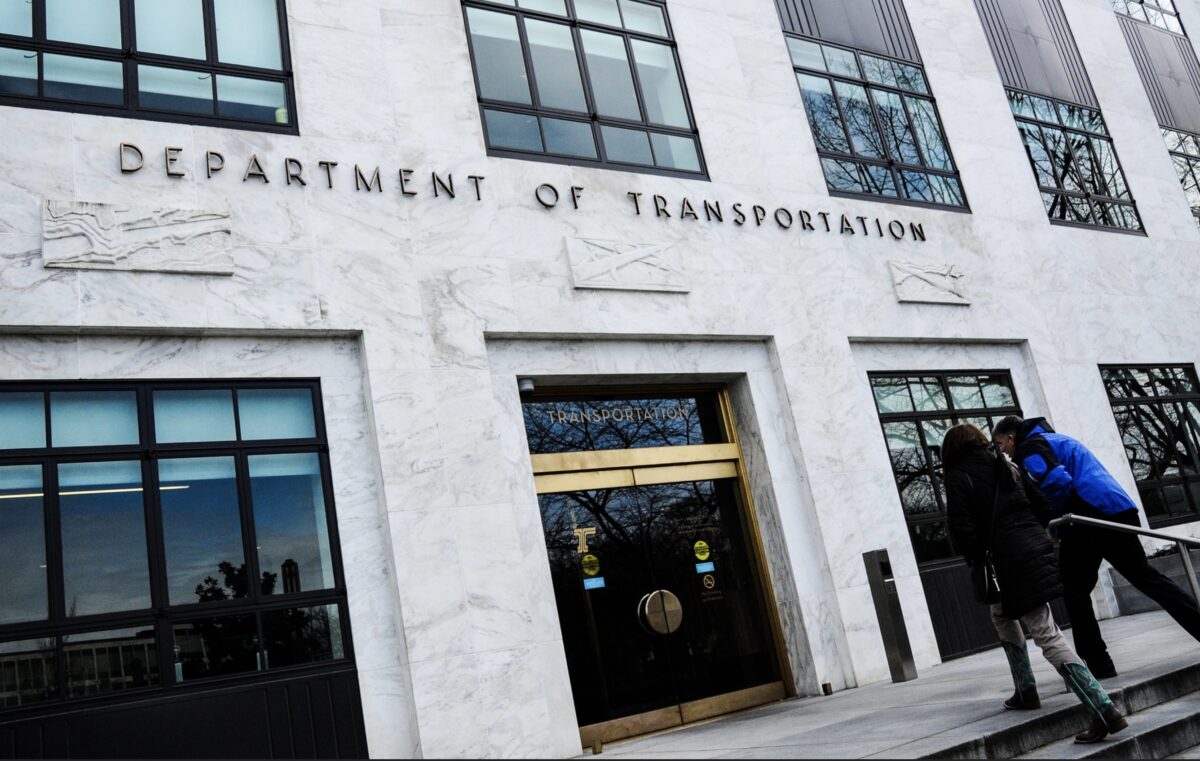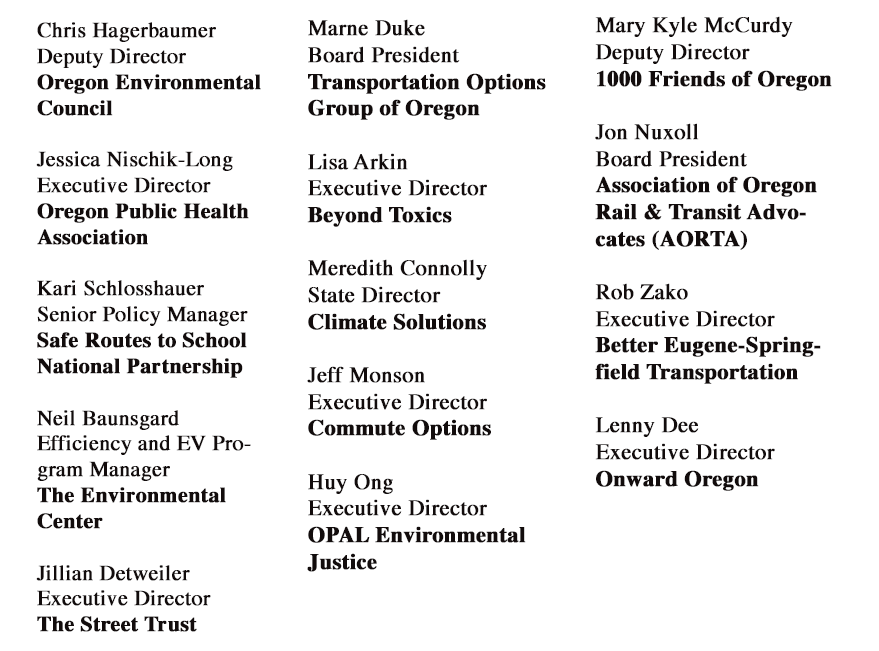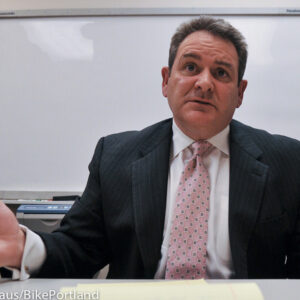
(Photos: Jonathan Maus/BikePortland)
After 14 years at the helm, Oregon Department of Transportation Director Matt Garrett resigned last month. For many reform-minded transportation advocates and professionals, he won’t be missed.
“Someone with some brains and integrity would be a healthy contrast to the outgoing director.”
— David Bragdon, former president of Metro
Reached shortly after the news broke on January 18th, The Street Trust Executive Director Jillian Detweiler told us, “He leaves an agency that does not seem prepared for the challenges and opportunities to meet Oregon’s transportation needs in a way that lives up to our values.” Detweiler went on to say that his departure is, “An opportunity for the Governor and Oregon Transportation Commission [the governor-appointed body that oversees ODOT] to hire someone who can lead ODOT to adopt multi-modal strategies for transportation that will address climate change, confront the negative impacts of highways on people of color and low income communities, and save lives.”

Former Metro President David Bragdon (no stranger to sharp ODOT criticisms) was even more direct in his response about Garrett’s resignation. “It’s good news for Oregon, and long overdue,” he shared with me via email. “Finally, the end of a reign of error – hundreds of millions of dollars wasted on cost overruns, false testimony to the legislature and public, rampant cronyism, an insatiable addiction to debt, and near-total ignorance of modern trends in transportation, cloaked in meaningless platitudes and p.r. spin, the one thing he was semi-good at.”
Bragdon said for the agency to get back on strong footing the Governor should, “Recruit a disciplined manager from outside, with a track record of financial honesty, knowledge of modern engineering principles, with the skill to deliver projects on time and on budget. Someone with some brains and integrity would be a healthy contrast to the outgoing director.”
Advertisement
Now the effort to influence the next leader of ODOT has begun in earnest. Yesterday a broad coalition of environmental, social justice, and transportation advocacy groups sent a list of recommendations to Governor Kate Brown and the Oregon Transportation Commission (OTC) to make sure the next person in this crucial role reflects their values.
“As you understand,” the letter (embedded below) reads, “our state’s transportation system — like a road — should not be an end in itself but a means to multiple ends. Oregonians expect transportation investments to not merely help move people, goods and services, but to also advance economic, social, health and environmental goals.”
Here are the 14 advocacy leaders who signed the letter:
The letter goes on to outline the importance of making transportation safe and affordable, and using transportation to achieve Oregon’s climate change and public health goals. There’s also a strong demand for going beyond the usual suspects when it comes to not only choosing the new director — but in who’s asked for input in making the selection.
The coalition even gives the OTC and Governor Brown a template for how to write the job description. They outline seven requirements for the job (each of which includes a detailed description):
1. A strong transportation knowledge base.
2. A track record of responsible management of the transportation system, with a focus on maintaining our transportation assets and prioritizing safe and efficient use of transportation infrastructure.
3. A track record of solving access and mobility needs with holistic, equitable, multimodal investments.
4. Demonstrated ability to align transportation investments with environmental, environmental justice, and public health objectives, e.g., meeting the state’s greenhouse gas reduction goals.
5. Demonstrated ability to create robust, two-way relationships with external partners and stakeholders.
6. A commitment to addressing the issues raised in the most recent audit of ODOT, to taking a fresh look at ODOT’s functions, and to making decisions independently from stakeholders with a financial interest in such decisions.
7. Experience leading a diverse staff and encouraging innovation, collaboration, and inclusivity to achieve equity in outcomes as core business objectives.
Check out the full letter below:
[pdf-embedder url=”https://bikeportland.org/wp-content/uploads/2019/02/ODOT-Director-hire-recommendations-2019-1.pdf” title=”ODOT Director hire recommendations 2019 (1)”]
What qualities would your ideal ODOT Director have? Do these recommendations mesh with your vision?
— Jonathan Maus: (503) 706-8804, @jonathan_maus on Twitter and jonathan@bikeportland.org
Never miss a story. Sign-up for the daily BP Headlines email.
BikePortland needs your support.








Thanks for reading.
BikePortland has served this community with independent community journalism since 2005. We rely on subscriptions from readers like you to survive. Your financial support is vital in keeping this valuable resource alive and well.
Please subscribe today to strengthen and expand our work.
I’m nominating Jonathan Maus
The Community Cycling Center supports these recommendations as well, I was just a day late in responding to the sign-on-invitation and we missed the cutoff!
“Finally, the end of a reign of error – hundreds of millions of dollars wasted on cost overruns, false testimony to the legislature and public, rampant cronyism, an insatiable addiction to debt, and near-total ignorance of modern trends in transportation, cloaked in meaningless platitudes and p.r. spin, the one thing he was semi-good at.” – One of the best quotes I have ever read on BP!
David Bragdon should be ODOT’s next director!
One of the highlights of living in NYC was seeing David Bragdon speak or moderate at TransitCenter every month. So intelligent and articulate.
It would be my guess that there are hundreds of ODOT employees who are silently applauding Garrett’s resignation. I think the advocate’s letter spells out a good framework for considering ODOT’s next leader. Decision makers would do well to follow its guidance.
A decade ago I appeared for public testimony at a meeting of the Oregon Transportation Commission to ask why Multnomah County had budgeted outlandish money for replacing the Sellwood bridge. MULTCO had a firm $90 million bid from a major engineering consortium, but had bumped the budget up to more than twice that.
Garrett, who is NOT an engineer, was off to the right but in my peripheral vision, as Gail Achterman, the OTC Chair, explained that her staff had determined that any cost more than $80 million produced no net benefit to Oregon’s system of transportation. Garrett bored in on me, eyeball-wise.
A year or so later Achterman was dead, and Sellwood’s budget (!) had risen to over $300 million.
The fraud at Sellwood was greater than the rat-hole planning for Columbia River Crossing, and they got away with it.
I wonder sometimes—often—why we end up with so many people in jobs they are terrible at. I am very familiar with the Peter Principle, and perhaps that is all we need to know, but remain outraged that in our system oversight over people like Garrett doesn’t work, that unqualified people get stuck running things, destroying not just lives and our our environment, but our faith in the system itself.
I don’t know about Bragdon. How many acres of “open space” does metro own that is completely inaccessible to anyone because of “no budget”? Metro seems great at buying land then doing nothing with it other than to lock it up forever. This is during a housing crisis. So..there is that.
“…housing crisis.”
I don’t think we have a shortage of land, but a longage of people.
Following your logic—building houses and more houses and more houses on every scrap of land—doesn’t actually solve the problem; it just postpones and exacerbates the eventual reckoning.
I wouldn’t count on Kate Brown to reform ODOT. I haven’t done this, but I bet if you got transcripts of all her speeches and written communiqués, and concatenated them and searched them for “bik” and “bic” you would find vanishingly few instances. But I remain open to being pleasantly surprised.
So what reckoning are you referring to, exactly? Do you really believe Portland/Metro/Oregon is remotely close to some hypothetical limit of density? And yes, buying up land with government dollars does one thing. It artificially restricts housing in order to drive up values so that it prices out the undesirables (in their mind).
I have heard that “so you want to build on every scrap of land” mantra from quite a few elite types. It’s catchy.
“So what reckoning are you referring to, exactly?”
Pick your poison. Climate chickens coming home to roost and the end of cheap oil are just the two I think about most. We’ve been pushing against limits through our heavy reliance on fossil fuels for every conceivable task, and we have not seen fit to make preparations for when those conditions no longer obtain.
“Do you really believe Portland/Metro/Oregon is remotely close to some hypothetical limit of density?
Carrying capacity is not just measured in acres, but in terms of the totality of material and energetic demands placed on our surroundings.
“And yes, buying up land with government dollars does one thing. It artificially restricts housing in order to drive up values so that it prices out the undesirables (in their mind).”
Oh, thanks for clarifying that.
“I have heard that “so you want to build on every scrap of land” mantra from quite a few elite types. It’s catchy.”
I am not sure what an elite type is. I’m not sure it is catchy; mostly I think it is self-defeating.
To what end would we do this? Engage in this supply-side frenzy?
I am reminded of the outraged bank customer who is informed that his account has been overdrawn. To which he indignantly retorts: ‘but I still have all these checks in my checkbook!’